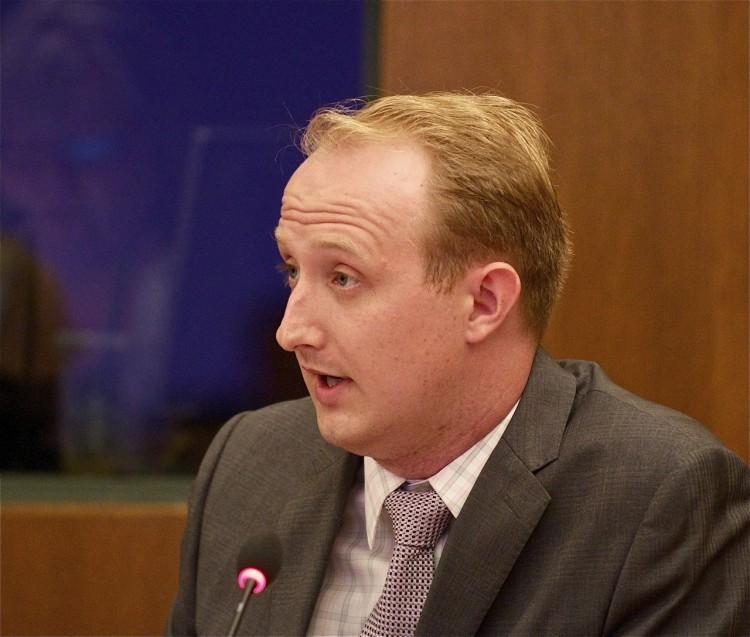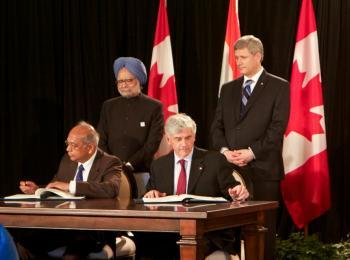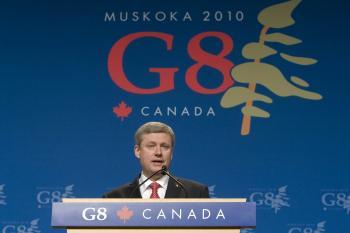TORONTO—Prime Minister Stephen Harper’s office has denied it asked the parliamentary press gallery to exclude two media outlets—including this newspaper—from a proposed press conference with Chinese leader Hu Jintao during his visit to Ottawa in June.
On Tuesday, the prime minister’s press secretary, Andrew MacDougall, told The Epoch Times the office had never asked the press gallery to exclude the two media, which also included Chinese-language network New Tang Dynasty TV.
The two outlets are often critical of Beijing but both are members in good standing with the Canadian Parliamentary Press Gallery.
“The Prime Minister’s Office made clear that Canada is a democracy with a free press and reporters cannot be excluded from events based on their beliefs,” MacDougall said.
In the end, the two leaders held only a photo-op and took no questions, doing away with the customary joint press conference. Media reports said this was because the press gallery had refused to exclude journalists from the two outlets, despite efforts by the PMO.
In a June 25 front-page story in Montreal’s Le Devoir newspaper, journalist Hélène Buzzetti, president of the Canadian Parliamentary Press Gallery, reported that Chinese embassy officials had approached organizers of a press conference a few weeks before Hu’s arrival and asked that the two media be excluded.
When the gallery refused, Buzzetti said the embassy found a willing accomplice in the Prime Minister’s Office.
“Those around Mr. Harper began trying to negotiate a compromise with the press gallery, without success. Finally, the event (which was never officially announced) was cancelled,” she wrote.
In July, NTDTV Canada’s president Joe Wang wrote to Dimitri Soudas, the prime minister’s communications director, requesting an explanation for the incident.
Asked if the PMO had tried to exclude the two media from a press conference, Soudas responded, “No we did not since there wasn’t one scheduled.”
Both The Epoch Times and NTDTV have felt the Chinese regime’s pressure before.
Epoch Times journalists in China have been imprisoned for their work. In 2006, the newspaper also suffered a series of attacks on offices outside China. The attacks were condemned by Reporters Without Borders and the Committee to Protect Journalists.
Reporters Without Borders also says it was pressure from Beijing that led European satellite company Eutelsat to drop NTDTV’s signal—which had been broadcast into China—less than two months before the Beijing Olympic Games.
Both media first reported in Chinese as a response to Beijing’s success in steering the editorial direction of Chinese-language media outside of China, which almost unanimously parrot Beijing’s line on sensitive topics.
Each reported on the outbreak of SARS and the official cover-up weeks before Chinese authorities acknowledged the outbreak.
Days before Hu was to arrive in Canada, The Epoch Times published reports based on recordings it obtained of a talk inside the Chinese embassy in Ottawa which showed the embassy was paying—and in some cases forcing—overseas Chinese to join rallies intended to shield Hu from protesters.
The story was picked up by several major Canadian media, and a number of groups have now called for the expulsion of Liu Shaohua, the embassy official caught on tape rallying Chinese students to prepare for “battle” with protesters.
Though the PMO denied any role in keeping the media out during Hu’s visit, MacDougall made no secret that it was Beijing who opposed the press conference.
On Tuesday, the prime minister’s press secretary, Andrew MacDougall, told The Epoch Times the office had never asked the press gallery to exclude the two media, which also included Chinese-language network New Tang Dynasty TV.
The two outlets are often critical of Beijing but both are members in good standing with the Canadian Parliamentary Press Gallery.
“The Prime Minister’s Office made clear that Canada is a democracy with a free press and reporters cannot be excluded from events based on their beliefs,” MacDougall said.
In the end, the two leaders held only a photo-op and took no questions, doing away with the customary joint press conference. Media reports said this was because the press gallery had refused to exclude journalists from the two outlets, despite efforts by the PMO.
In a June 25 front-page story in Montreal’s Le Devoir newspaper, journalist Hélène Buzzetti, president of the Canadian Parliamentary Press Gallery, reported that Chinese embassy officials had approached organizers of a press conference a few weeks before Hu’s arrival and asked that the two media be excluded.
When the gallery refused, Buzzetti said the embassy found a willing accomplice in the Prime Minister’s Office.
“Those around Mr. Harper began trying to negotiate a compromise with the press gallery, without success. Finally, the event (which was never officially announced) was cancelled,” she wrote.
In July, NTDTV Canada’s president Joe Wang wrote to Dimitri Soudas, the prime minister’s communications director, requesting an explanation for the incident.
Asked if the PMO had tried to exclude the two media from a press conference, Soudas responded, “No we did not since there wasn’t one scheduled.”
Both The Epoch Times and NTDTV have felt the Chinese regime’s pressure before.
Epoch Times journalists in China have been imprisoned for their work. In 2006, the newspaper also suffered a series of attacks on offices outside China. The attacks were condemned by Reporters Without Borders and the Committee to Protect Journalists.
Reporters Without Borders also says it was pressure from Beijing that led European satellite company Eutelsat to drop NTDTV’s signal—which had been broadcast into China—less than two months before the Beijing Olympic Games.
Both media first reported in Chinese as a response to Beijing’s success in steering the editorial direction of Chinese-language media outside of China, which almost unanimously parrot Beijing’s line on sensitive topics.
Each reported on the outbreak of SARS and the official cover-up weeks before Chinese authorities acknowledged the outbreak.
Days before Hu was to arrive in Canada, The Epoch Times published reports based on recordings it obtained of a talk inside the Chinese embassy in Ottawa which showed the embassy was paying—and in some cases forcing—overseas Chinese to join rallies intended to shield Hu from protesters.
The story was picked up by several major Canadian media, and a number of groups have now called for the expulsion of Liu Shaohua, the embassy official caught on tape rallying Chinese students to prepare for “battle” with protesters.
Though the PMO denied any role in keeping the media out during Hu’s visit, MacDougall made no secret that it was Beijing who opposed the press conference.



